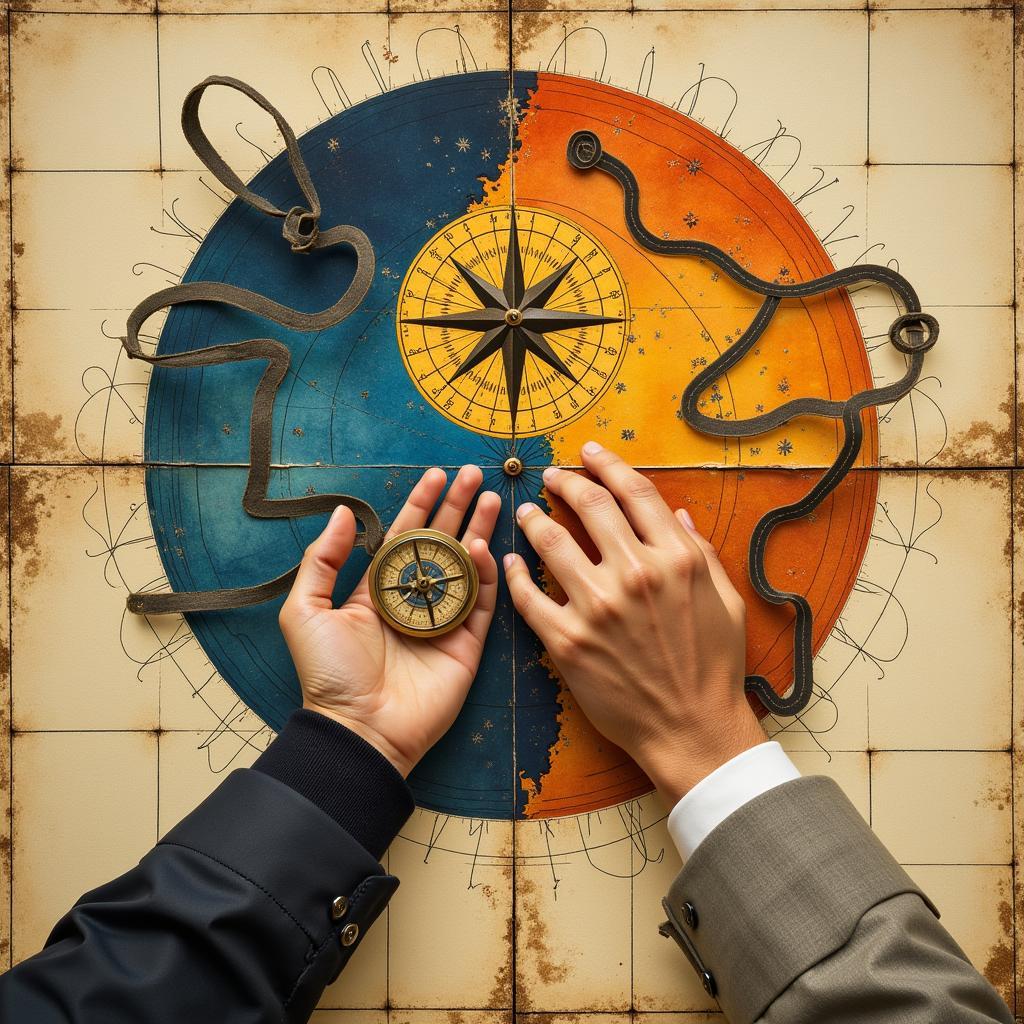Kismat, often translated as fate or destiny, is a concept deeply ingrained in many cultures, particularly in South Asia. It represents the belief that our lives are, to some extent, predetermined by a force beyond our control. This captivating idea has influenced literature, music, and everyday conversations for centuries, leading many to question its nature and impact on our choices.
Exploring the Meaning of Kismat
Kismat Kya Hoti Hai? What exactly is fate? This question has intrigued philosophers and spiritual seekers for ages. Some view kismat as a fixed path, an unalterable script written in the stars. Others perceive it as a guiding hand, gently nudging us towards certain experiences and outcomes. Still others see kismat as a blend of preordained events and free will, a complex interplay of destiny and personal choice.
Different Perspectives on Fate
The concept of kismat varies across different cultures and belief systems. In some, it’s associated with divine intervention, a higher power orchestrating the course of human lives. In others, it’s tied to karma, the principle of cause and effect where past actions influence future experiences.
- Fatalism: This perspective suggests that kismat dictates everything, leaving no room for individual agency. Every event, from the mundane to the momentous, is predetermined and unavoidable.
- Free Will: This opposing viewpoint emphasizes the power of individual choice. We are the architects of our own destinies, shaping our lives through conscious decisions and actions.
- The Middle Ground: Many believe that kismat and free will coexist. Fate may set the stage, but we have the freedom to choose how we play our roles. Our choices within the framework of destiny shape our experiences.
 Concept of Kismat, Fate, and Destiny
Concept of Kismat, Fate, and Destiny
Kismat in Love and Relationships
Kismat often plays a significant role in narratives of love and relationships. The idea of two souls destined to meet, despite the odds, is a recurring theme in literature and folklore. This romanticized view of kismat suggests that certain relationships are preordained, written in the stars.
Is Love Predestined?
Many people wonder if their soulmate is out there, waiting to be found. While the idea of predestined love is alluring, it’s important to remember that healthy relationships require effort and commitment from both partners. Kismat might bring two people together, but nurturing and sustaining the relationship requires conscious choice and action.
- Attraction vs. Effort: While initial attraction might feel like kismat, building a strong relationship takes work. Communication, understanding, and mutual respect are essential ingredients.
- The Role of Choice: We have the power to choose who we spend our time with and invest our emotions in. Even if we believe in kismat, we still have the agency to decide whether to pursue or maintain a relationship.
Kismat and Personal Growth
While kismat may seem like a limiting factor, it can also be a catalyst for personal growth. Challenges and setbacks, often attributed to fate, can present opportunities for learning and self-discovery.
Embracing the Unknown
Accepting the uncertainties of life, the twists and turns that seem beyond our control, can be liberating. Instead of resisting what fate throws our way, we can choose to embrace it as a chance to develop resilience and adaptability.
- Learning from Experiences: Every experience, whether positive or negative, shapes who we are. Difficulties can strengthen our resolve and teach us valuable lessons.
- Finding Meaning in Adversity: Even in the face of hardship, we can find meaning and purpose. Kismat may present us with obstacles, but it’s our choice how we respond to them.
Conclusion
Kismat, a concept as old as time, continues to fascinate and intrigue us. Whether we believe it’s a fixed path or a gentle guide, it reminds us of the intricate interplay of destiny and free will. Ultimately, how we choose to interpret and respond to the events in our lives shapes our individual journeys. Understanding kismat is not about passively accepting a predetermined future, but rather about embracing the unknown with courage and wisdom. Kismat kya hoti hai? Perhaps it’s the tapestry woven by the threads of fate and the choices we make along the way.
FAQ
-
Can we change our kismat? This is a complex question with varying answers depending on individual beliefs. Some believe we can influence our fate through positive actions and intentions, while others see it as largely predetermined.
-
How does kismat relate to karma? Karma, the principle of cause and effect, is often intertwined with the concept of kismat. Past actions can influence present experiences, shaping what might be perceived as fate.
-
Does believing in kismat make us passive? Not necessarily. While acceptance of certain circumstances is important, believing in kismat can also empower us to make the most of the opportunities presented to us.
For further assistance, please contact us at Email: Contact@ViperCircle.com or address: G-5, लोअर परेल, सेनापति बापट मार्ग, मुंबई, महाराष्ट्र – 400013, भारत।. We have a 24/7 customer service team.